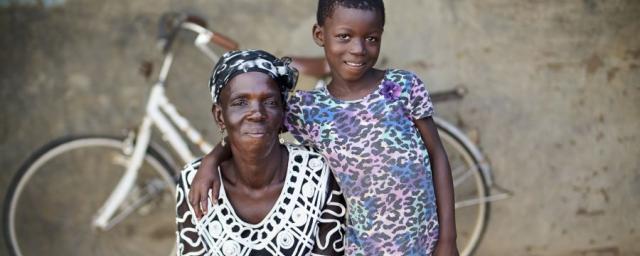
Despite significant progress, large inequalities persist in Ghana. Oxfam estimates that just one of the richest men earns more in a month than one of the poorest women could earn in 1,000 years. Photo: Nana Kofi Acquah/Oxfam
Ghana’s story is one of partial success. Economic growth in the past 20 years has been impressive and was matched by a significant reduction in poverty levels: these more than halved between 1992 and 2013. The country is now the second-largest economy of the West Africa region, after Nigeria.
However, inequality is on the rise, undermining poverty reduction, holding back economic growth and threatening social stability. Recent trends suggest that the richest are capturing an ever-larger share of the benefits of growth. Poverty reduction has not been spread evenly, particularly between men and women, and the north and the south.
Let’s look at the numbers
1,000 years Oxfam estimates that just one of the richest men in Ghana earns more in a month than one of the poorest women could earn in 1,000 years. While 1,000 extra millionaires were created between 2006 and 2016, nearly 300,000 people could have been lifted out of poverty, had inequality not increased during this period.
2% The wealthiest 10% of Ghanaians now share 32% of Ghana’s total consumption – more than is consumed by the bottom 60% of the population combined, while the very poorest 10% of the population consumes only 2%.
6% Gender inequality remains a pervasive issue. Women are more likely to be poorer and to have fewer assets. For instance, they are half as likely as men to own land. They are also significantly less likely than men to be wealthy – only 6% of the richest people in Ghana are women.

5 years Despite significant progress, large inequalities in health persist. Less than 2% of the poor are covered by the National Health Insurance Scheme. A child born in Ghana to one of the wealthiest families is three times more likely to make it past their fifth birthday than a child born to a poorer family.
1 in 3Nearly a third of the poorest children in the Northern Region have never been to school, compared to just 5% of the wealthiest. Girls in particular are losing out on a chance of a better life, with the poorest girls from the most marginalized regions facing the greatest challenges.
1 in 5 The labor market is dominated by low-earning employment in the informal sector. Seven out of 10 jobs are estimated to be ‘vulnerable’ and only one in five jobs could be considered to meet the standard of decent work. Consequently, at least one in every five working Ghanaians is poor.
Building a more equal Ghana
These disparities in income, consumption and wealth are not an accident. They are driven by fiscal and socio-economic policies pursued over the years that are not doing enough to tackle economic inequality. They have in fact often reinforced it.
To tackle inequality, Ghana needs a human economy. It needs an economy that works equally for women as it does for men, and where the government guarantees everyone’s right to quality public healthcare and education. It needs an economy driven by the interests of the 99%, not just an elite at the top.
This will ultimately ensure a more prosperous future for all of Ghana, where no one is left behind.